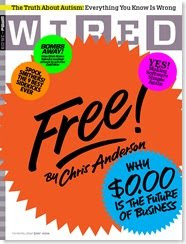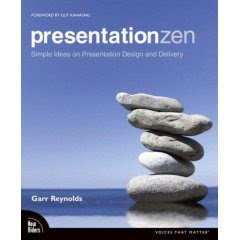
Chris Anderson, the author of my
book of the year in 2006:
The Long Tail, has recently written a great feature in
Wired magazine on the power of FREE!!! He has created a useful taxonomy for a new kind of business model in which some aspects of the offering are given away for nothing. Giving things away for FREE makes it really easy to appeal to consumers to use your product BUT even though the end users get something for free, someone in the economic ecosystem is making money -- in some cases loads of money. The different models Anderson lists are:
The freemium. Basic versions of products (such as software) are given away for free, while premiums and upgrades are offered for a price. The reason that works is that the cost of providing the basic version is pretty low, and the profits made on the upgraded version are substantial. Examples of this model that have recently sucked me into buying the upgraded version of a service or product for a premium price after using the free version include:
Linked in – the online business networking tool
PB wiki – the service that enables you to create and host wiki websites (I use as course portals for all the courses that I teach).
Survey Monkey – the online data gathering service that enables you to set up an online quiz or questionnaire.
Advertising. This is probably the best known of the ‘free’ models and has formed the basis for many traditional industries, from newspapers to television. Where advertising dollars go now, however, has been subject to radical change, which in turn has dramatically shifted the economic underpinnings of many industries, while creating great wealth for others. The core idea is that advertisers will pay to get your attention, regardless of the ‘free’ offerings you actually came to consume. Think
gmail, magazine websites:
Entrepreneur mag etc, and well-visited blogs:
Guy Kawasaki or
Seth Godin.
Cross-subsidies. These are the traditional loss-leaders well known to retailers. The idea here is that you give away one product (or portion of a product) in the pursuit of charging higher prices on others. Offers in the supermarket that loose money, low-priced CD’s at Wal-Mart or Happy Hour drinks at the local pub are all provided to get you to actually buy the more expensive offers (the CD player at Wal-Mart or the food at the pub). The key assumption in this model is customers actually are open to cross-purchasing which is not always the case – with the internet making it far easier to “shop around” customers may be very specific about what they purchase where.
 Zero marginal cost.
Zero marginal cost. Software distributed over the web and digital music would fall into this category. While there is a cost to create the initial offer, the cost of distributing it broadly is very low. Sometimes, the free good is actually a come-on for another item. For instance, while it may be impossible for a singer to limit the distribution of songs in digital form, they may actually make their money on concert sales (a variant on the cross-subsidy idea). Many open-source software businesses are established on this model – they give the software away and then charge for a manual or a service to assist in effectively using the software tool.
Labor Exchange. In this model, marketers offer you something for free in exchange for your providing information or assistance to them. Anderson uses the example of Google providing ‘free’ directory assistance because they can use the calls to improve their voice-recognition technology, potentially opening the way to a huge market down the road.
Gift economy. In this model, things are given away for free out of altruism or because people simply enjoy doing the work required to create the goods. The classic examples here would also be some open-source software and Wikipedia entries. People voluntarily create and consume the free good.
I think this is a really cool feature that adds a whole new dimension to understanding business models and appreciating how to make money on and an off the web.
For more info and responses – link to Chris Anderson's
blog entry on the topic or check out the article in
Wired:
Free! Why $0.00 Is the Future of Business
 Barack Obama's victory in the US presidential race is nothing if not entrepreneurial. He used innovation, communication and genuine passion to take on the establishment (and win). Here are some of the entreprenerial lessons from the Obama campaign:
Barack Obama's victory in the US presidential race is nothing if not entrepreneurial. He used innovation, communication and genuine passion to take on the establishment (and win). Here are some of the entreprenerial lessons from the Obama campaign:

















